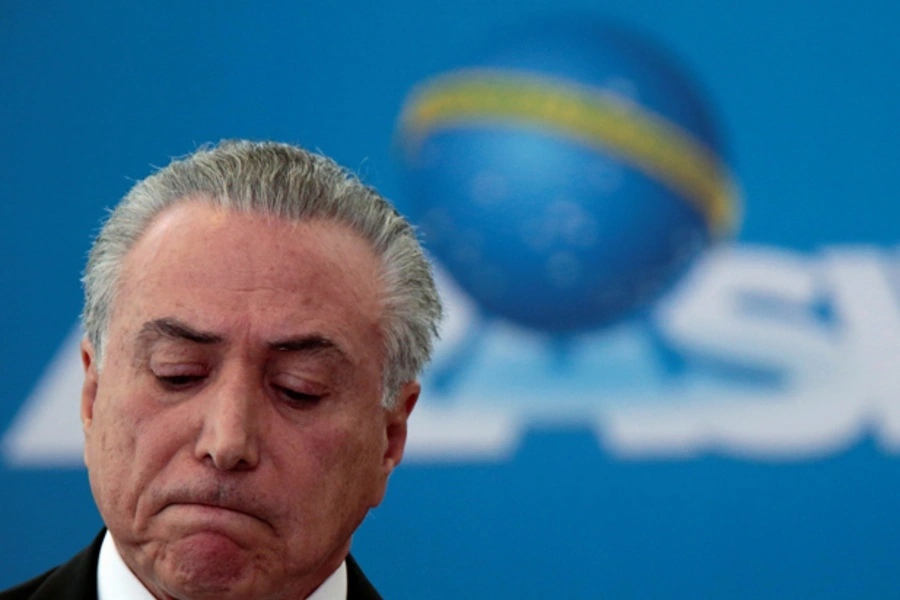Brazil’s Challenging Distractions

More on:
Michel Temer’s first month as interim president has not been the stuff of dreams. Even though important elements of urgently needed economic reforms have advanced, impeachment politics continue to cast a long shadow, corruption investigations continue to percolate, and Temer’s legitimacy remains under constant assault.
As impeachment continues to move forward in the Senate, Dilma Rousseff and her supporters have pulled out all the stops. Actors at Cannes and other cultural events have protested the alleged coup, demonstrators have hit the streets alongside former President Lula, and perhaps looking for a wedge that might drive moderates to her side, Rousseff has suggested that if reinstated, she would call for new elections. Public support for impeachment has fallen slightly, although most Brazilians say they would rather not see Rousseff return and chances are still better than not that she will be convicted by the Senate in August. But Rousseff’s supporters know that their own long-term political fortunes depend on questioning the legitimacy of impeachment, and fence-sitting senators seem to be using the uncertainty surrounding support for impeachment to extract a pound of flesh from the interim president.
Temer has built a defensive cabinet, following the time-tested recipe of appointing ministers who faithfully represent the majority legislative coalition. They are complemented by a parallel kitchen cabinet of technocrats in the Finance Ministry, the National Development Bank (BNDES), Banco do Brasil, Treasury, and state-owned enterprises. The bifurcated cabinet may help to ensure Temer’s survival, but it also helps to explain the ambiguous results of the last month: progress on fiscal reforms, such as more realistic fiscal targets and the DRU law (which reallocates tax revenues in favor of the federal government), but also important setbacks, such as a tone deaf congressional push for higher civil service wages. Most damaging, of course, is that Temer’s allies, especially within the PMDB party, are a constant embarrassment: wiretapped conversations between a defendant in the Lava Jato case and party heavyweights Renan Calheiros, José Sarney, and Romero Jucá, suggested an effort to undermine anticorruption efforts and confirmed many Brazilians’ worst suspicions about the Temer coalition.
Recognizing his own tenuous support and the likely political confusion of coming months, Temer appears to be governing largely symbolically, announcing a number of high-impact measures that require little legislative support, such as reducing the number of ministries, creating a new concessions program, rebuilding regulatory agencies, and reviewing the rules on Petrobras’ participation in the pre-salt oilfields. The most important major legislative initiative announced by the government is social security reform, but debate over the specifics of the proposal is unlikely before municipal elections in October, given that Temer cannot afford a divisive battle while Congress is still fighting the impeachment battle or distracted by electoral politics. The best news in the short term is that the Temer administration is reportedly planning to back a series of accountability reforms proposed by the Ministério Público prosecutorial service, presumably to help it to recover some modicum of credibility in the anticorruption effort.
Multiple corruption investigations continue to destabilize the political world. A plea bargain by former OAS executive Leo Pinheiro included allegations of campaign finance violations by Marina Silva, one of the few prominent politicians as yet untainted by the Lava Jato case. Rumors of a plea bargain by construction magnate Marcelo Odebrecht and the investigation of former President Lula’s involvement in the Petrobras scandal have Brasília abuzz. The Zelotes investigation of tax evasion seems to have moved into a new phase with the indictment of the president of one of Brazil’s largest private banks, Bradesco. The possible removal of Eduardo Cunha from the Chamber of Deputies presidency continues to generate sparks in Congress, and there is (as yet unfounded) speculation that Cunha might try to save his skin through a plea bargain of his own. Meanwhile, the impeachment trial will move into higher relief beginning next week, as the defense presents its case and President Rousseff is scheduled to testify.
In sum, the coming weeks and months are likely to remain full of drama and tension, with a distracted political class focused less on governance than survival. In the background, almost as an afterthought, will be efforts to address the multiple economic challenges the country faces: heavily burdened state companies, the threatening fiscal deficit, and the critical situation of Brazil’s state governments.
More on:
 Online Store
Online Store